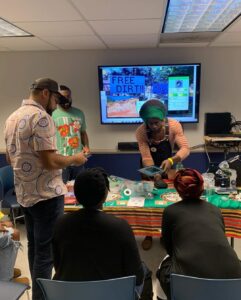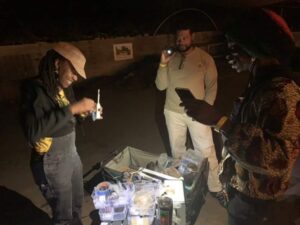Final report for FNC22-1356
Project Information
Before this grant, each of the partner farms in the project carried out sustainable practices. These practices included: composting, no-till and low-till production, cover cropping, and more. Sankara Farm is the newest operation with 3 years of sustainable production, Antioch Urban Farm and KC Farm School at Gibbs Road have 5 years each.
Municipalities are strategizing to mitigate the direct negative impacts of climate change. The Kansas City Climate Action Playbook published in 2019 stated:
"...City staff and contractors can transition away from the use of conventional fertilizers to the use of biochar or compost mixes that will improve the soil’s capacity to sequester carbon, feed plants and hold rainwater."
Citizen science initiatives increase knowledge transmission and community participation in the production of innovative solutions and local knowledge. People's protagonism presents a method of mobilizing ecological stewardship, social responsibility and organizing local agricultural producers and gardeners to increase local environmental awareness and agency. Our project utilizes art to enhance our capacity to shift focus from soil amendments to soil microbes.
Local agricultural producers have the capacity to enact traditional sustainable practices and investigate new strategies to mitigate climate change. Healthy soil is vital to both production of nutritious food and carbon sequestration. Access to soil testing is a major barrier for many urban growers because of both cost and technical capacity. This project will increase the awareness of soil ecology, provide tool access to research soil health and facilitate the capacity to produce and test living compost containing beneficial microbiology.
The Community Soil Science Cooperative initiated by farmers, backyard gardeners, and agricultural professionals will produce and monitor Johnson-Su compost, and research its impact on soil health, plant growth, and nutrient density. Realizing that farms are sites of research and education, the Cooperative will utilize hands-on workshops to increase awareness of the universe of microorganisms in the soil and provide training on tools made available in a network of soil science tool libraries. Extensive AgroArt multimedia outreach materials will increase awareness of soil ecology and carbon sequestration will be made available on our websites.
Cooperators
- - Technical Advisor (Educator)
Research
Our Community Soil Science Cooperative is conducting several tests to determine the effectiveness of fungally active compost produced in a Johnson-Su bioreactor. We have several Bioreactors, each producing compost in different conditions (greenhouse, high tunnel, in the field.) We are monitoring the temperature and humidity of the bioreactors using Arduino micro-controllers and soil sensors. We chose micro-controllers because of the capacity to provide real time data of the conditions the bioreactors. We also have the capacity to add additional sensors for future functionality to our farms. We are measuring the fungal to bacterial ratio of the compost using micro-Biometers, Earthfort soil tests, and building a special archive of the compost using our NIR Spectrometer. We viewed all of these tools as appropriate technologies to improve the capacity for on farm research.
We are measuring the yields of crops grown in Jo-Su Compost to determine which temperature and humidity and fungal to bacterial ration produces the best yields. Each of our farm is running independent tests, using the same equipment with a control and a test bed. Data collection takes place using our Arduino, micro-Biometer app, and google spreadsheet.
At this stage in the project we have installed our Arduinos and sensors and are working our data storage procedures. We have conducted several microBiometer tests on our compost. We have not performed any Earthfort test and are waiting for the second half of the project to purchase and utilize the Nir Spectrometer.
Our test results from our partner farms tests:
Antioch Urban Growers:
Research results and outcomes; our main test was the comparison between our test soil and our control soil. Interestingly, our control soil had better. Germination and faster growth. And yet our refractometer gave the produce a higher occurrence of nutritional density in our arugula test and a lower nutritional density in the radish. Our microbiometer test
Showed very little difference in our control and test samples with a 31% fungi to 69% bacteria. We had a lot to learn in the using of all of the tools that we acquired through the grant. We were continually getting more solid test as we learned the science and methods of testing. One of my takeaways is the need for a specific person in charge of the testing that was not learning. We are learning a lot about the tools and the procedures.
Tracy Garden:
Nov 29, JoSu Built Luke Welch, In his yard
March 18, 2023
Hosted Leap into Spring at KC Farm School-
event brought 60 people
March 25, 2023
Hosted CSSC & The Land Institute, presented
concept and findings to 400 people
(2 hours)
April 22, 2023
Built 1 Johnson-Su bioreactor with Boy
Scouts and Marty Kraft (4 hours) at Compost
Fest, 500 people
Educational & Outreach Activities
Participation summary:
Learning Outcomes
We have been able to gain valuable knowledge about our capacity and our strengths. We learned that coordinating between three farms is a challenge for a part time coordinator position, and that building a tool library is a technical challenge that requires a lot of back end work. We have been consistent with meetings and keeping on schedule with our programming calendar and workshop schedule. We underestimated the time it takes to gain useful knowledge of the tools we are using to measure our results.
Project Outcomes
We were able to present the Community Soil Science Cooperative at the 10th annual Black Urban Growers conference in Atlanta, GA in October. We presented a workshop on using Micro-Biometers for fungal to bacterial soil analysis, demonstrated how to use remote soil sensing using our arduinos and raised awareness about increasing soil health with microbiology. In Atlanta we were invited by Truly Living Well Farm to test the compost being produced there.
Each Johnson-Su build is a great educational event. The event is hands on and the questions come naturally, and with curiosity about the whole process. Those at each site are encouraged to share the resulting inoculant with neighbors to increase a sense of neighborhood community laden with greater environmental understanding. The potential for carbon sequestration and food health are emphasized at each event. When the soil is healthy both health and climate balance are served. Photos of each event were shared on social media.

